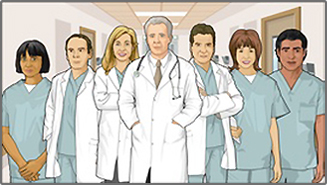Ovarian hyperstimulation syndrome
OHSSOvarian hyperstimulation syndrome (OHSS) is a problem that is sometimes seen in women who take fertility medicines that stimulate egg production.
-
Causes
Normally, a woman produces one egg per month. Some women who have trouble getting pregnant may be given medicines to help them produce and release eggs.
If these medicines stimulate the ovaries too much, the ovaries can become very swollen. Fluid can leak into the belly and chest area. This is called ovarian hyperstimulation syndrome (OHSS). OHSS occurs only after the eggs are released from the ovary (ovulation).
You may be more likely to get OHSS if:
- You receive a shot of human chorionic gonadotropin (hCG).
- You get more than one dose of hCG after ovulation.
- You become pregnant during this cycle.
OHSS rarely occurs in women who only take fertility drugs by mouth.
OHSS affects 3% to 6% of women who go through in vitro fertilization.
Other risk factors for OHSS include:
- Being younger than age 35
- Having a very high estrogen level during fertility treatments
- Having polycystic ovarian syndrome
##RemoveMe##
-
Symptoms
The symptoms of OHSS can range from mild to severe. Most women with the condition have mild symptoms such as:
- Abdominal bloating
- Mild pain in the abdomen
- Weight gain
In rare cases, women can have more serious symptoms, including:
- Rapid weight gain (more than 10 pounds or 4.5 kilograms in 3 to 5 days)
- Severe pain or swelling in the belly area
- Decreased urination
- Shortness of breath
- Nausea, vomiting, or diarrhea
##RemoveMe##
-
Exams and Tests
If you have a severe case of OHSS, your health care provider will need to monitor your symptoms carefully. You may be admitted to the hospital.
Your weight and the size of your belly area (abdomen) will be measured. Tests that may be done include:
- Abdominal ultrasound or vaginal ultrasound
- Chest x-ray
- Complete blood count
- Electrolytes panel
- Liver function test
- Tests to measure urine output
##RemoveMe##
-
Treatment
Mild cases of OHSS usually don't need to be treated. The condition may actually improve the chances of becoming pregnant.
The following steps can help you ease your discomfort:
- Get plenty of rest with your legs raised. This helps your body release the fluid. However, light activity every now and then is better than complete bed rest, unless your doctor tells you otherwise.
- Drink at least 10 to 12 glasses of fluid a day (especially drinks that contain electrolytes).
- Avoid alcohol or caffeinated beverages (such as colas or coffee).
- Avoid intense exercise and sexual intercourse. These activities can cause ovarian discomfort and may cause ovarian cysts to rupture or leak, or cause the ovaries to twist and cut off blood flow (ovarian torsion).
- Take an over-the-counter pain reliever such as acetaminophen (Tylenol).
You should weigh yourself each day to make sure you are not putting on too much weight (5 or more pounds or about 2 kilograms or more a day).
In the rare case that you develop severe OHSS, you will probably need to go to a hospital. The providers there will give you fluids through a vein (intravenous fluids). They will also remove fluids that have collected in your body, and monitor your condition.
##RemoveMe##
-
Outlook (Prognosis)
Most mild cases of OHSS will go away on their own after menstruation starts. If you have a more severe case, it can take several days for symptoms to improve.
If you become pregnant during OHSS, the symptoms may get worse and can take weeks to go away.
##RemoveMe##
-
Possible Complications
In rare cases, OHSS can lead to life-threatening complications. These can include:
- Blood clots
- Kidney failure
- Severe electrolyte imbalance
- Severe fluid buildup in the abdomen or chest
##RemoveMe##
-
When to Contact a Medical Professional
Call your health care provider if you experience any of the following symptoms:
- Less urine output
- Dizziness
- Excessive weight gain, more than 5 pounds (2 kg) a day
- Very bad nausea (you cannot keep food or liquids down)
- Severe abdominal pain
- Shortness of breath
##RemoveMe##
-
Prevention
If you are getting injections of fertility medicines, you will need to have regular blood tests and pelvic ultrasounds to make sure that your ovaries aren't over-responding.
##RemoveMe##
References
Fauser BCJM. Medical approaches to ovarian stimulation for infertility. In: Strauss JF, Barbieri RL, eds. Yen & Jaffe's Reproductive Endocrinology. 7th ed. Philadelphia, PA: Elsevier Saunders; 2014:chap 30.
Lobo RA. Infertility: etiology, diagnostic evaluation, management, prognosis. In: Lobo RA, Gershenson DM, Lentz GM, Valea FA, eds. Comprehensive Gynecology. 7th ed. Philadelphia, PA: Elsevier; 2017:chap 42.
Rebar RW, Catherino WH. Reproductive endocrinology and infertility. In: Goldman L, Schafer AI, eds. Goldman-Cecil Medicine. 25th ed. Philadelphia, PA: Elsevier Saunders; 2016:chap 236.



